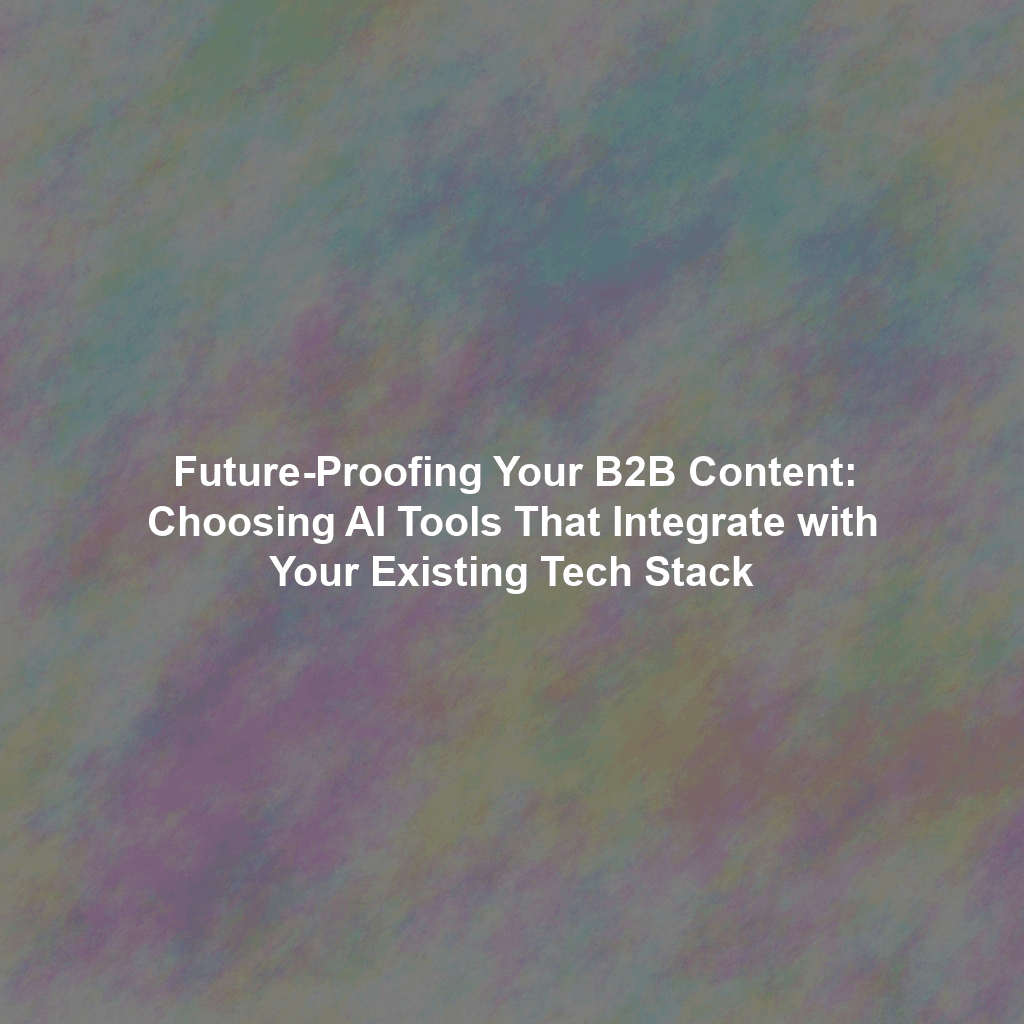The B2B content landscape is evolving at breakneck speed. By 2025, Artificial Intelligence (AI) won’t just be a ‘nice-to-have’—it will be a core component of any successful content strategy. But simply throwing AI tools at your content creation process won’t cut it. To truly unlock the potential of AI, you need to prioritize integration. This means selecting AI solutions that seamlessly weave into your existing tech stack: your CRM, marketing automation platform, CMS, and other critical systems.
Future-Proofing Your B2B Content: Choosing AI Tools That Integrate with Your Existing Tech Stack
Imagine a world where AI-powered content suggestions appear directly within your CRM as you interact with a lead. Envision blog posts being automatically optimized for SEO based on data pulled from your marketing automation platform. This is the power of integrated AI, and it’s the key to maximizing your content ROI in 2025.
Why Integration Matters: Avoiding AI Chaos
Without proper integration, your AI tools risk becoming isolated silos. This can lead to:
- Data Duplication and Inconsistencies: Manually transferring data between systems is time-consuming, error-prone, and can lead to conflicting information.
- Workflow Bottlenecks: Jumping between different platforms disrupts your content creation workflow and slows down production.
- Limited Insights: Siloed data prevents you from gaining a holistic view of your content performance and identifying areas for improvement.
- Wasted Investment: Ultimately, a poorly integrated AI tool becomes underutilized, negating its potential benefits and wasting your investment.
Identifying Your Integration Needs: A 2025 Perspective
Before you start evaluating AI tools, take stock of your existing tech stack and identify your specific integration needs. Consider these questions:
- CRM Integration: How can AI enhance your sales process through content? Do you need AI to suggest relevant content based on lead behavior, automatically personalize email campaigns, or generate sales scripts?
- Marketing Automation Integration: How can AI improve your lead nurturing efforts? Do you need AI to optimize email send times, personalize content based on customer segmentation, or automate social media posting?
- CMS Integration: How can AI streamline your content publishing process? Do you need AI to suggest SEO keywords, optimize readability, or automatically generate metadata?
- Analytics Platform Integration: How can AI provide deeper insights into your content performance? Do you need AI to identify content gaps, analyze user engagement, or predict future trends?
Key Features to Look for in Integrated AI Content Tools
When evaluating AI tools, prioritize these features to ensure seamless integration and maximum ROI:
- Open APIs: Look for tools with robust and well-documented APIs (Application Programming Interfaces). This allows for flexible integration with a wide range of platforms.
- Native Integrations: Some AI tools offer native integrations with popular B2B marketing platforms. This provides a seamless and out-of-the-box integration experience.
- Zapier/IFTTT Compatibility: Integration platforms like Zapier and IFTTT can connect AI tools with hundreds of other applications, even if they don’t have native integrations.
- Custom Integration Options: For complex integration requirements, consider tools that offer custom integration options, such as SDKs (Software Development Kits) or professional services.
- Data Security and Privacy: Ensure that the AI tool complies with relevant data security and privacy regulations, such as GDPR and CCPA.
Top AI Tools to Watch in 2025 (Focus on Integration)
While the AI landscape is constantly evolving, here are a few categories and examples of AI tools known for their strong integration capabilities (remember to research specific offerings as the market changes):
- AI-Powered Content Generators with CRM Integration: These tools can generate personalized content for sales outreach, customer service, and lead nurturing. Look for integrations with platforms like Salesforce, HubSpot, and Zoho CRM. (Examples: Consider researching evolving capabilities of Jasper.ai, Copy.ai, and Persado.)
- AI-Driven SEO Tools with CMS Integration: These tools can optimize your content for search engines directly within your CMS. Look for integrations with platforms like WordPress, Drupal, and Contentful. (Examples: Keep an eye on Surfer SEO’s and SEMrush’s AI-driven content functionalities and integration with CMS platforms.)
- AI-Enabled Marketing Automation Platforms: These platforms use AI to personalize email campaigns, automate social media posting, and optimize marketing workflows. (Examples: Research the AI capabilities integrated into HubSpot, Marketo, and ActiveCampaign).
- AI-Powered Analytics Platforms: These platforms provide deeper insights into your content performance and identify areas for improvement. (Examples: Explore how Google Analytics 4 and similar platforms are incorporating AI for better data analysis).
The Human Element: Never Replace, Always Enhance
While AI can automate many content creation tasks, it’s important to remember that it’s not a replacement for human creativity and expertise. The best approach is to use AI to enhance your existing content team’s capabilities, freeing them up to focus on higher-level tasks such as strategy, storytelling, and relationship building. AI should be viewed as a powerful assistant, not a complete replacement.
Conclusion: Embracing the Integrated AI Future
In 2025, successful B2B content marketing will be defined by the intelligent integration of AI into existing workflows. By prioritizing tools that seamlessly connect with your CRM, marketing automation platform, CMS, and other critical systems, you can unlock the full potential of AI and achieve significant gains in efficiency, personalization, and ROI. Don’t just adopt AI – integrate it strategically to future-proof your content strategy and stay ahead of the curve.
 Skip to content
Skip to content

